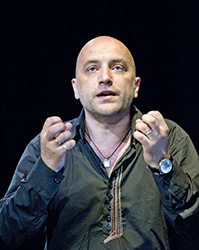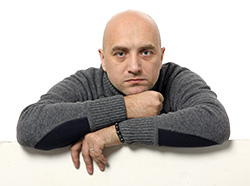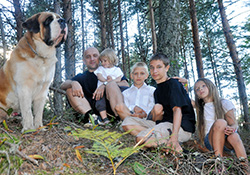More than a Game
ZAKHAR PRILEPIN, ONE OF THE MOST READ RUSSIAN WRITERS, EXCLUSIVELY FOR ”NATIONAL REVIEW”
Behold, God Exists
Serbia is a wonderful country, with open and beautiful people. Lots of sky, very good poetry, very tasty food, saints in temples with swords and clairvoyant eyes of righteous men and warriors. Today’s world is spinning around, chasing its tail. Soon the ideas which marked the end of the XX century will go to hell and we’ll not be sorry one single bit about it. We flatter ourselves thinking that we are smarter than people who lived in the XV century or before Christ. The entire freedom is inside, there is much vanity and chaos outside. Angels are not outside, they nest within us, only they cannot live on dumps
By: Vesna Kapor
Translation from Russian: Radmila Mečanin
Photo: NR Press and Guest’s Archive
 He united many unusual characters within himself, so it’s perhaps logical that he became a writer. Son of history teacher Nikolai Semjonovich and doctor Tatyana Nikolaevna, born in 1975 in the village of Ilyinka in the Ryazan Region. He was artisan, guard, loader, even commander of Russian special police forces in Chechnya. He graduated from the Faculty of Philology and School of Public Politics at the State University in Nizhny Novgorod. After his novels Pathologies (2005), Sanyka (2006) and Sin (2007) he has become one of the most influential and most translated contemporary Russian writers. He united many unusual characters within himself, so it’s perhaps logical that he became a writer. Son of history teacher Nikolai Semjonovich and doctor Tatyana Nikolaevna, born in 1975 in the village of Ilyinka in the Ryazan Region. He was artisan, guard, loader, even commander of Russian special police forces in Chechnya. He graduated from the Faculty of Philology and School of Public Politics at the State University in Nizhny Novgorod. After his novels Pathologies (2005), Sanyka (2006) and Sin (2007) he has become one of the most influential and most translated contemporary Russian writers.
He lives in Nizhny Novgorod, happily married, four children. Director of the local office of Nova Gazeta and editor in chief of the Free Press (Свабодная Пресса) website. More about him on his personal website: www.zaharprilepin.ru.
We spoke during his recent visit to Serbia.
The world of your literary interest is contemporary Russia. Russian man, his feeling for the homeland, nation, are the foundations of building characters and narration in your works?
Part of it is true. However, it’s not only contemporary Russia. Now, if God allows me, I’m finishing my new big novel Family – taking place in the 1920s. Furthermore, the events in the novel Black Monkey have nothing to do with ideas such as ”homeland” and ”nation” – it shows people who fell out of these ideas. For the rest you’re right.
In Sanyka you say that the future of Russia is the new-forgotten-old nation. How much is literature able to help in preserving the own history and culture of a nation?
You know, there was a terrible blockade in Leningrad during World War II. Hundreds of thousands of people died of hunger. Scientists somehow managed to preserve seeds of the most important agricultural cultures in laboratories and were not allowed to touch them. They could’ve made a meal from them, but they preserved them, in spite of everything!
It’s similar with literature: in the most difficult times, it preserves the seed from which a nation can grow to a new spiral of living.
Finally, every nation was created from a myth. At the beginning there was the word – then came the nation, its heroes, its image.
How much does personal experience influence the creation of a literary work?
In my case – very much. I don’t have the obligation to live the entire life of my characters, but I have the duty to know what they experienced when times were painful, terrible or joyful for them.
In order for a writer to know this, he must sometimes do what his characters are doing. Fortunately, I have done many things I write about before I started writing.
Serbian readers recognized you as their writer. Did you feel it in Serbia, in contact with your readers?
Oh, yes! Nowhere in the world do I feel so peaceful, so joyful, as I do in my family. Serbs are my favorite readers. My books were translated into sixteen languages and in some countries, such as France and Italy – especially Italy – I have a very good audience, wonderful people. But Serbia is… my secret passion and love.
THE SPAN OF THE RUSSIAN MAN
 Writing for you is an impulse, a way of life, or rather a premeditated work? Writing for you is an impulse, a way of life, or rather a premeditated work?
Depends. I think of it as a job. If tomorrow I would be given the biggest prize in my life, I’d write much less. Sometimes I cannot manage to live because I have so much work to do. But, in general, the feeling when I end a novel is very pleasant. You carry the rock into the mountain and, all of a sudden, it rolls down. It’s a relief.
And, finally, if it weren’t for my books – when would I come to Serbia and meet so many wonderful people? I am fortunate. Only because I maniacally loved poetry from my early childhood and because I’m entirely pervaded with literature, it’s part of my nature. Now literature is taking me around the world.
Can literature influence the society today or does it just have a supporting role in the life of contemporary man?
On one hand, it seems that people are reading less.
On the other, writers in Russia are very important people. Even the opposition protests in Russia are led by writers – for example Limonov, or Dmitry Bykov, or Boris Akunin. And gatherings supporting the government are led by other writers – for example Alexander Prohanov or Yuri Polyakov.
Writers in Russia are considered show biz stars, they often appear on covers of magazines, they are guests of the most prestigious TV shows. Therefore it’s certain they have a very strong influence.
Your characters often, even when in situations with no way out, feel almost physically tangible happiness. The thing is in small things and feelings of the characters, their ability to see and enter the depths of themselves and the world. How would you define a Russian, present and past? (Is there a difference at all?)
There probably is a difference – but the difference is still not an abyss. It can still be jumped over. A Russian man – as an ideal pattern – is very strong, very tolerant, thinks very little about the value of his life and is able to part from it when fate puts him before a choice. Besides, he is very rough, pretty sloppy and prone to external effects: all kinds of stupid shopping, drunken arrogance, fights, banalities. But the fact that his appreciation for himself is low and that he doesn’t relate to his life enables him to be forgiven for many things.
The Russian man, regardless of the fact that he built an empire, is very tolerant and liberal in terms of religion. Today, the way the West is diligently teaching Russia how it should live in the world, how we should live in our own country, is sometimes ridiculous to me. There were dozens of Slavic tribes on the territory of present Germany – and they exterminated them all. Any nation that lived on the Russian territory 700 years ago is still living there today. We will teach people to be tolerant, don’t interfere in our things.
Besides, I repeat once again, Russia is enormous, rough, sometimes a stiff country. It may turn to the other side and drop a small state into the sea by accident. By pure accident.
HOMAGE TO RUSSIAN WOMAN, GREAT AND AMBIGUOUS
 What about the Russian woman? The respect and gentleness towards women in your works are especially emphasized? What about the Russian woman? The respect and gentleness towards women in your works are especially emphasized?
Oh, Russian woman! One must do something with her. She has become unyielding a long time ago. Time has already come to tame her again, like a monster of the steppe. Especially because she also got bored of being out and free.
The Russian woman is very beautiful and very smart. I’m not surprised at all by the fact that half of Hollywood stars are married to Russian women. Amazing beauty and intellect, angel-like (yet illusive) character on the outside – that’s our breed, that’s the Russian woman. The scandals with which divorces of Hollywood stars from their Russian wives end afterwards are very funny for me. The boys didn’t realize who they were marrying. One should keep in mind that the Russian woman is the same woman who gives birth to the Russian soldier. And they probably think that the diva with big eyes and long legs is one, and the soldier, who reached Berlin on his tank and destroyed the most terrible army in the world, is something else. It turns out, however, that they are related.
I love Russian women. One of them is my mother, the other my wife.
I still didn’t understand who captured who, although we have stopped the war a long time ago, since anyway she’s impossible to conquer.
A woman appears as a source of strength and essence of life. Are your female characters and the attitude towards them a reflection of tradition or your own perception?
First it was my own perception, but later I’ll make it a tradition. Literature is tradition. Pushkin and Tolstoy invented the Russian nation. Even the Russian lady. I, as far as my strength allows me, try to add some features to her wonderful portrait.
Family in your works is almost always the main foundation in the life of your characters. What is the role of family today and what does it mean to you personally?
Family is my foundation. The words roditelji - rod - Rodina (parents – family – homeland) have the same root in Russian, not without a reason.
The family is going through difficult times. Contemporary world is investing too much to destroy it. A human, they explain, owes nothing to anyone – he is free from his homeland, language, his wife and his children. He obviously isn’t free only from his genitals, which he has the obligation to use as freely as possible.
All this brings sad thoughts to me.
However, in order to improve the situation, there is no other way but to show with your personal example that family is a treasure. To prove that one who deprives himself of family and children – deprives himself of earth and roots. It turns out, sooner or later, that he is in a vacuum and weightless. Then it’s most often too late.
I often remind people of this. Many get angry with me, consider it interfering in their private life. And they’re right. However, I’m not worried about anyone’s private life, but the future of Russia. In order for Russia to exist, we need to have a certain number of new, educated, beautiful and honorable people, who have the feeling of debt towards the past and the future.
A RAVENOUS FREEDOM
The main difference between your growing up in your family and raising your children?
I think there is no difference. I raise my children the way I was raised. I’m not attempting to be dogmatic and tell them how they should behave. I just try to behave in a way that my children never see the difference between what I’m saying and the way I’m living.
In today’s high-tech and alienated world, what future could young generations expect?
Advancement doesn’t change anything. In vain we think that we are living in a ”new era”, in the ”era of information”. We’re flattering ourselves. We are not smarter than people who lived in the XV century, even those from the III century B.C. We are still lazy, naked creatures, without claws and fur. And when our opinion of ourselves becomes too high, we are reminded of who we are. God exists.
Your literary fame enables you to travel a lot. What is your impression about that world?
The world is spinning in circles. Soon civilization will come to the point that the ideas that seemingly won at the end of the XX century – the ideas of liberalism, multiculturalism, globalism, capitalist economy, tolerance – will go to hell. And I cannot say it frightens me.
Despite the ruthlessness of the new order, a feeling of almost naive faith that the world can be changed and that soul is above everything remains after your books. How is the soul preserved?
It shouldn’t be spent on your freedom. Freedom devours everything. The entire genuine freedom is inside. There is much vanity and chaos outside. Sergei Yesenin, great Russian poet, wrote: ”Terrible is the fact that the soul is passing, like youth, like love”.
It’s true. The soul passes. Its departure is more terrible than the departure of youth. When the soul leaves, the most monstrous feeling arrives – the feeling that God has abandoned you. Yesenin hanged himself, that feeling killed him. But he left us wondrous poems where everything is told.
First you safeguard your soul, then your soul safeguards you. Angels live in a safeguarded soul. When artists picture them flying behind our backs, they are deceiving us. Angels make nests within us. It’s just that they cannot live in dumps.
***
If Russia Didn’t Exist, I’d Be a Serb
What is your general impression about Serbia?
Madly beautiful country, with openhearted and beautiful people. Lots of sky, very good poetry, very tasty food, saints in temples carrying swords, with clairvoyant eyes of righteous men and warriors. If Russia didn’t exist, I’d be a Serb.
***
Love for the Entire Lifetime
Judging by your characters, family and childhood are the foundations of any human’s personality?
Yes. And love. When children don’t get enough of it in childhood, they continue searching for it all their lives. And never find it. That’s why children must be adored. It fills them with happiness for their entire lifetime.
***
Doesn’t Work
Can a society survive without family?
Well, let’s try. Just not in Russia or Serbia. And see what happens. It seems to me that very soon people with big families and many children will come to that country. And they will mock the white fools who concluded they don’t need women and children.
|
